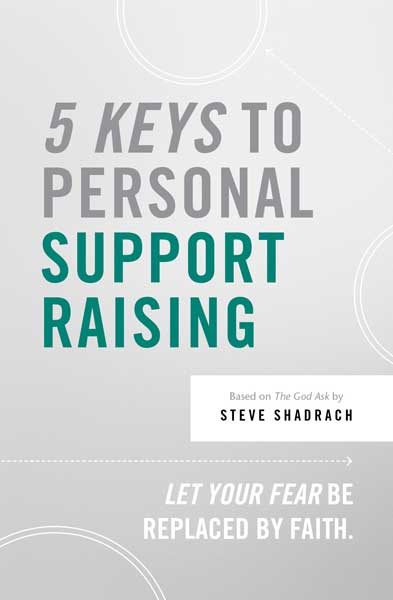
What is a “sprint”?
An MPD Sprint is a 30-45 day period in which full-time staff spend part-time (20 hours a week) in a support raising season supported by a coach and in community with fellow staff. These sprints create an environment of camaraderie, excitement, and activity focused goal setting.
Why a sprint?
It’s no secret that support raising is one of the most difficult aspects of being a missionary. If left unchecked, staff may creatively avoid their support raising until it slowly becomes a problem so big that it not only affects their ministries, but their entire lives. But why is this? Why do so many avoid support raising like the plague and pile on the work of ministry so high that entering a season of support raising feels like climbing Mount Everest?
When a staff member leaves the field for a period of time to fundraise (either part time or full time), it is typically because that individual is in or near deficit or at a percentage of monthly support that is not sustainable. In addition to the financial strain they are likely experiencing, they may also feel it is on them to muster the motivation to right the ship. Feelings of inadequacy, loneliness, and lack of support or accountability can make this time significantly more difficult.
Who can relate?
It’s all about the atmosphere!
Consider Ecclesiastes 4:9-10: “Two are better than one, because they have a good reward for their toil. For if they fall, one will lift up his fellow. But woe to him who is alone when he falls and has not another to lift him up!”
Which situation would you prefer:
Being given a bag of golf clubs, a couple of lessons, and being expected to shoot par by the end of the season?
or
Being part of a team that meets together regularly to practice the sport, run drills, share in successes and setbacks, all while having a coach provide vision for the team, sharpening of team member skills, and feedback as you play the game?
No one wants to “lone wolf” it during a support raising season. And this is a main reason why sprints have been such a success for our organization.
Launching an MPD Sprint
When I began in the role as Director of Coaching, I was quickly sobered by the fact that I had become the director of something that didn’t really exist. Yes, there were a good handful of coaches spread throughout the organization, but not a strong cohesive coaching team who all spoke the same MPD language and coached using the same best practices. So I started by inviting several staff friends to help me build this new network and be part of a team of MPD coaches (again, notice the use of the word “team”).
After getting on the same page with best practices, our team of part-time coaches (all field staff committing 10 hours a week to coaching) set out to persuade a staff region to be our guinea pigs for this new idea of an MPD Sprint. Thankfully two regions were excited to provide their staff with an opportunity to raise support arm in arm with others from their region and have the support of a coach.
How to start and facilitate a sprint:
- Have each participant sign up on a Google form with information that would be useful for their coach.
- Group 3 coachees with each coach to form a cohort.
- Send prep work to each participant (a pre-sprint processing worksheet for preparing their hearts and attitudes and a simple planner with a goal-setting tab and a contacts tab to write down 50 potential partners with phone numbers).
- Schedule a video conferencing kickoff call on the first day of the sprint to provide biblical vision, encouragement, and a sense of togetherness.
- Plan a “phone blitz” (20-30 set up calls for face-to-face meetings) after the kickoff call to help quickly build momentum. This can also be done before the start of a sprint.
- Coaches plan weekly cohort huddles during the sprint to encourage their coachees from the scriptures, provide group accountability, teach brief skill sharpening workshops, and pray for one another.
- Coaches also schedule weekly 1-on-1 calls with each coachee to provide a deeper level of support, encouragement, and accountability.
- Coaches participate in a weekly Coaches Huddle where the facilitator preps them with the next week’s cohort huddle content, they discuss any coaching opportunities that arise and develop as coaches in a “learning lab” atmosphere.
- The facilitator sends out a weekly email to sprint participants with encouragement, recognition for the week’s pacesetters based on # of calls and # of referrals received, and a goal thermometer tracking total sprint progress with # of total meetings completed and total new monthly support raised.
- Each participant fills out a weekly report enumerating activity and support raised for the week.
- Towards the end of the sprint, coaches help their coachees create a plan to keep the momentum going after the sprint and think long term about how to implement regular support raising activities into their week.
Do sprints really work?
After 12 sprints completed over the past 16 months with a total of 150 staff, we’ve seen the Lord provide an average of $600-$700 in new monthly support per staff, but we have even seen the Lord provide upwards of $1,500 in new monthly support. We are now scheduling our sprints on a quarterly basis and opening them up to anyone in the organization as we add coaches and streamline our processes.
Sprints don’t have to be limited to staff in a budget deficit. Many have incorporated sprints into their ongoing MPD strategy, using them to build or increase a buffer or raise toward a specific project or need.
The beauty of the sprints is twofold:
1) We have done them throughout the entire year, not just in the summer.
2) Staff can be “in the field” while participating in a sprint. Yes, it can be difficult, but with proper schedule adjustments anyone can make the time to devote 20 hours a week towards support raising for a short season.
The best part is that that staff are so encouraged that they talk about it with their staff friends! Our main recruiters for sprints are staff who have been a part of one. Also, most of our new coaches are staff who have participated in a sprint and were so thankful and encouraged by their coach that they wanted to do the same for other staff.
Praise God for His wisdom and provision that He gives generously to those who ask. He truly is Jehovah-Jireh, the Lord who will provide.
Are you ready for a sprint?
Additional Tools and Resources
Join SRS Network for tools and resources created specifically for support raising coaches, trainers and leaders, including our Coaching Guide and webinar series. Catch Jeff Martin in our live webinar with interactive Q&A in May!

